Papers by Tafat Hacohen-Bick
המוסך, 2022
מסה על כתיבה על חיות

Worldviews: Global Religions, Culture, and Ecology
Haviva Pedaya’s book The Eye of the Cat presents an innovative theology of ecology, yet in corres... more Haviva Pedaya’s book The Eye of the Cat presents an innovative theology of ecology, yet in correspondence with traditional Jewish-Kabbalistic sources. I discuss Pedaya’s ecopoetic reading of these sources, as well as her own midrashim in this regard. Pedaya raises questions regarding the place of man in the world; political questions regarding center and periphery; urbanization and nature; construction and destruction. These questions arise via the book’s unique poetic expression. Pedaya offers a theology of waste, addressing the place of garbage in the human sphere through the Kabbalistic idiom regarding the collection of qlipoth (“husks” קליפות,). The Kabbalistic project of collecting the qlipoth, which previously functioned in the context of an esoteric and mostly secretive symbolic system, now takes on a different meaning in light of the real “husks” that demand to be collected and reused.
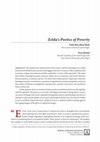
We explore the intersection of the poetic and the theological in Zelda Schneurson Mishkovsky’s po... more We explore the intersection of the poetic and the theological in Zelda Schneurson Mishkovsky’s poetry and suggest that the two join to offer a political and economic critique of secularism and the capitalistic “society of the spectacle.” We claim that Zelda’s theological-poetic moment relates also to semiotics and to the relations between poetry, economy, and use. We show how Zelda’s poetry rephrases, from this theological-poetic articulation, a position of signification and meaning that confronts the axioms of Western metaphysics and presents a poetics of poverty and a political stance of free use. Zelda’s poems desire a moment of union and reconciliation between the signifier and the signified. Her poetry is not only a theological attempt to bring about a mystical union of things and words, signified and signifier, poetry and theology, but also an attempt to open up the option of use, poor and simple and thus free. Poverty, for Zelda, is not an aesthetic disposition but a politica...
במאמר זה אני עוסקת בספר שמש שקוהלת לא ידע של סיוון הר-שפי, אולם אני מבקשת לראות אותו כחלק מתופעה ... more במאמר זה אני עוסקת בספר שמש שקוהלת לא ידע של סיוון הר-שפי, אולם אני מבקשת לראות אותו כחלק מתופעה רחבה של התהוותו של פמיניזם דתי פוסט-ליברלי.
הספר מתאפיין בהיפוכי פרספקטיבות ומוסר את הדרמה של הנשמה הנופלת (או עולה) אל תוך הגוף. אני טוענת שהר-שפי חוזרת לבית ממש ולגוף האנושי ומתמודדת עם החומריות הממשית שלהם, ולא רק כסימבול לעולמות העליונים. בעזרת המושג "דירה בתחתונים", נכנסת הדוברת, הנשמה המיוצגת בדמותה של הציפור המעופפת, אל תוך העולם הזה, בבחינת "גם ציפור מצאה לה בית". זהו תהליך הפוך מהפרויקט הפמיניסטי, המנוסח לרוב במונחים של "שחרור" והתפשטות מרחבית. הספרות הפמיניסטית מתבססת על agency ואוטונומיה, על אפשרויות של השלת המגבלות וגילוי העצמי. אולם, הדוברת של הר-שפי מתעופפת מבחירה אל תוך הבית, רוצעת את אוזנה, משתעבדת בפתחו ומבקשת ללמוד מחדש את המלאכות הנעשות בו. באופן הזה היא מציעה אפשרות תיאולוגית פוסט-ליברלית של דוברת המרוויחה מפירות הפמיניזם, אך גם מסבכת ומבקרת את הנחות המוצא הליברליות.
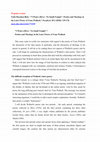
Tafat Hacohen-Bick, ""I Want a River / No Small Temple": Poetics and Theology in the Later Poetry of Yona Wallach, 2020
This essay seeks to rectify two omissions with regard to the poetry of Yona Wallach: the discussi... more This essay seeks to rectify two omissions with regard to the poetry of Yona Wallach: the discussion of her later poetry in particular, and the discussion of theology in her poems in general. It will do so by reading these two aspects of Wallach's poetry side by side. I will begin by explaining the characteristics of Wallach’s later poetry. Then I will proceed in examining in detail three poems that deal with the relationship with God, and I will suggest that Wallach portrays God as an actual figure that can be encountered in the flesh. I will also show how the image of God functions in relation to other subjects that Wallach is engaged with: sex, femininity, emotions and violence. Finally, I will propose a conceptual-historical context to the image of God that she produces
משיחים ומסיחים: פטפוט, רעש ושיטוט ב"עיר ומלואה" לעגנון, 2019

Dibur Literary Journal, 2018
We explore the intersection of the poetic and the theological in Zelda Schneurson Mishkovsky’s po... more We explore the intersection of the poetic and the theological in Zelda Schneurson Mishkovsky’s poetry and suggest that the two join to offer a political and economic critique of secularism and the capitalistic “society of the spectacle.” We claim that Zelda’s theological-poetic moment relates also to semiotics and to the relations between poetry, economy, and use. We show how Zelda’s poetry rephrases, from this theological-poetic articulation, a position of signification and meaning that confronts the axioms of Western metaphysics and presents a poetics of poverty and a political stance of free use.
Zelda’s poems desire a moment of union and reconciliation between the signifier and the signified. Her poetry is not only a theological attempt to bring about a mystical union of things and words, signified and signifier, poetry and theology, but also an attempt to open up the option of use, poor and simple and thus free. Poverty, for Zelda, is not an aesthetic disposition but a political stance, a unified symbol working against the raging images of the glory of capitalist images.
"מילת הכבוד של הרחוב: עיונים בשירתו של רוני סומק עורכים: נועה שקרג'י, יגאל שוורץ, קציעה אלון, רמת גן, גמא, 2019, 2019
המאמר עוסק בכינון הגבריות בספרו הראשון של רוני סומק: אני טוענת שהגבריות משורטטת בגולֶה בדקדקנות, ... more המאמר עוסק בכינון הגבריות בספרו הראשון של רוני סומק: אני טוענת שהגבריות משורטטת בגולֶה בדקדקנות, תוך חשיפת הסבך והאשמה שבו היא נתונה.

abstract: We explore the intersection of the poetic and the theological in Zelda Schneurson Mishk... more abstract: We explore the intersection of the poetic and the theological in Zelda Schneurson Mishkovsky's poetry and suggest that the two join to offer a political and economic critique of secularism and the capitalistic " society of the spectacle. " We claim that Zelda's theological-poetic moment relates also to semiotics and to the relations between poetry, economy, and use. We show how Zelda's poetry rephrases, from this theological-poetic articulation, a position of signification and meaning that confronts the axioms of Western metaphysics and presents a poetics of poverty and a political stance of free use. Zelda's poems desire a moment of union and reconciliation between the signifier and the signified. Her poetry is not only a theological attempt to bring about a mystical union of things and words, signified and signifier, poetry and theology, but also an attempt to open up the option of use, poor and simple and thus free. Poverty, for Zelda, is not an aesthetic disposition but a political stance, a unified symbol working against the raging images of the glory of capitalist images. " E very time that something is produced, that is, brought from concealment and nonbeing into the light of presence, there is poiesis, production, poetry, " writes Giorgio Agamben, arguing that poiesis, in its original meaning, is the revelation of something that is concealed in matter. Thus, poetry is always a refinement. 1 We employ this insight to read Zelda's poetry and to understand her declaration that " all that is needed is the 1 Giorgio Agamben, The Man without Content, trans. Georgia Albert (Stanford: Stanford University Press, 1999), 37.
Book Reviews by Tafat Hacohen-Bick
"Green Chaos: 'The modern version of hell is purposelessness',", 2021
Tafat Hacohen-Bick, "Green Chaos: 'The modern version of hell is purposelessness'," Ma'alah 1 (20... more Tafat Hacohen-Bick, "Green Chaos: 'The modern version of hell is purposelessness'," Ma'alah 1 (2021). Book review on Idan Landau, trans., The Tree by John Fowles (Asia: 2021), (Hebrew)
CONFERENCES, WORKSHOPS, COLLOQUIA by Tafat Hacohen-Bick

One of the main characteristics of the modern era is the appearance of a new and heightened for... more One of the main characteristics of the modern era is the appearance of a new and heightened form of subjectivity, accompanied by new sensitivities toward the self, on the one hand, and toward the deity and religion, on the other hand. In both cases renewed formulations are created of the relation between the deity and the deity’s commandments, as a source of external authority, and individuals, their wishes, and desires, as an internal source of authority. These changes have led to a dramatic shift in the relation toward sin and transgression and to the rise of perspectives in which sin has changed from being a threat to being an object of desire.
In this panel discussion, which summarizes the work of a research group that has functioned at the Van Leer Jerusalem Institute over the past year, we aim to examine critically the place of sin in Jewish religious thought and in Hebrew literature of the modern era, highlighting not only the enchantment with it but also the feeling of reverence and guilt attached to it, even in modern times.
The event is being held in conjunction with Bar-Ilan University.
Participants
Prof. Hamutal Bar-Yosef, Ben-Gurion University of the Negev
Dr. Leore Sachs Shmueli, Bar-Ilan University
Prof. Elliot Wolfson, University of California, Santa Barbara (in English)
Chair: Dr. Tafat Hacohen-Bick, Ben-Gurion University of the Negev

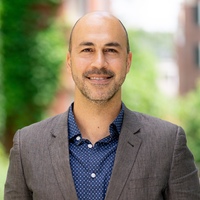
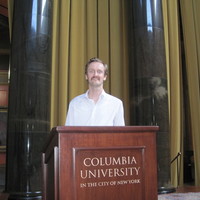

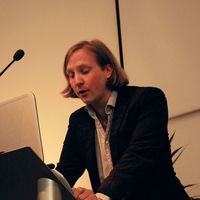


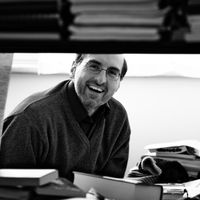

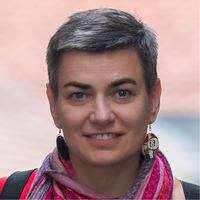
Uploads
Papers by Tafat Hacohen-Bick
הספר מתאפיין בהיפוכי פרספקטיבות ומוסר את הדרמה של הנשמה הנופלת (או עולה) אל תוך הגוף. אני טוענת שהר-שפי חוזרת לבית ממש ולגוף האנושי ומתמודדת עם החומריות הממשית שלהם, ולא רק כסימבול לעולמות העליונים. בעזרת המושג "דירה בתחתונים", נכנסת הדוברת, הנשמה המיוצגת בדמותה של הציפור המעופפת, אל תוך העולם הזה, בבחינת "גם ציפור מצאה לה בית". זהו תהליך הפוך מהפרויקט הפמיניסטי, המנוסח לרוב במונחים של "שחרור" והתפשטות מרחבית. הספרות הפמיניסטית מתבססת על agency ואוטונומיה, על אפשרויות של השלת המגבלות וגילוי העצמי. אולם, הדוברת של הר-שפי מתעופפת מבחירה אל תוך הבית, רוצעת את אוזנה, משתעבדת בפתחו ומבקשת ללמוד מחדש את המלאכות הנעשות בו. באופן הזה היא מציעה אפשרות תיאולוגית פוסט-ליברלית של דוברת המרוויחה מפירות הפמיניזם, אך גם מסבכת ומבקרת את הנחות המוצא הליברליות.
Zelda’s poems desire a moment of union and reconciliation between the signifier and the signified. Her poetry is not only a theological attempt to bring about a mystical union of things and words, signified and signifier, poetry and theology, but also an attempt to open up the option of use, poor and simple and thus free. Poverty, for Zelda, is not an aesthetic disposition but a political stance, a unified symbol working against the raging images of the glory of capitalist images.
Book Reviews by Tafat Hacohen-Bick
CONFERENCES, WORKSHOPS, COLLOQUIA by Tafat Hacohen-Bick
In this panel discussion, which summarizes the work of a research group that has functioned at the Van Leer Jerusalem Institute over the past year, we aim to examine critically the place of sin in Jewish religious thought and in Hebrew literature of the modern era, highlighting not only the enchantment with it but also the feeling of reverence and guilt attached to it, even in modern times.
The event is being held in conjunction with Bar-Ilan University.
Participants
Prof. Hamutal Bar-Yosef, Ben-Gurion University of the Negev
Dr. Leore Sachs Shmueli, Bar-Ilan University
Prof. Elliot Wolfson, University of California, Santa Barbara (in English)
Chair: Dr. Tafat Hacohen-Bick, Ben-Gurion University of the Negev
הספר מתאפיין בהיפוכי פרספקטיבות ומוסר את הדרמה של הנשמה הנופלת (או עולה) אל תוך הגוף. אני טוענת שהר-שפי חוזרת לבית ממש ולגוף האנושי ומתמודדת עם החומריות הממשית שלהם, ולא רק כסימבול לעולמות העליונים. בעזרת המושג "דירה בתחתונים", נכנסת הדוברת, הנשמה המיוצגת בדמותה של הציפור המעופפת, אל תוך העולם הזה, בבחינת "גם ציפור מצאה לה בית". זהו תהליך הפוך מהפרויקט הפמיניסטי, המנוסח לרוב במונחים של "שחרור" והתפשטות מרחבית. הספרות הפמיניסטית מתבססת על agency ואוטונומיה, על אפשרויות של השלת המגבלות וגילוי העצמי. אולם, הדוברת של הר-שפי מתעופפת מבחירה אל תוך הבית, רוצעת את אוזנה, משתעבדת בפתחו ומבקשת ללמוד מחדש את המלאכות הנעשות בו. באופן הזה היא מציעה אפשרות תיאולוגית פוסט-ליברלית של דוברת המרוויחה מפירות הפמיניזם, אך גם מסבכת ומבקרת את הנחות המוצא הליברליות.
Zelda’s poems desire a moment of union and reconciliation between the signifier and the signified. Her poetry is not only a theological attempt to bring about a mystical union of things and words, signified and signifier, poetry and theology, but also an attempt to open up the option of use, poor and simple and thus free. Poverty, for Zelda, is not an aesthetic disposition but a political stance, a unified symbol working against the raging images of the glory of capitalist images.
In this panel discussion, which summarizes the work of a research group that has functioned at the Van Leer Jerusalem Institute over the past year, we aim to examine critically the place of sin in Jewish religious thought and in Hebrew literature of the modern era, highlighting not only the enchantment with it but also the feeling of reverence and guilt attached to it, even in modern times.
The event is being held in conjunction with Bar-Ilan University.
Participants
Prof. Hamutal Bar-Yosef, Ben-Gurion University of the Negev
Dr. Leore Sachs Shmueli, Bar-Ilan University
Prof. Elliot Wolfson, University of California, Santa Barbara (in English)
Chair: Dr. Tafat Hacohen-Bick, Ben-Gurion University of the Negev